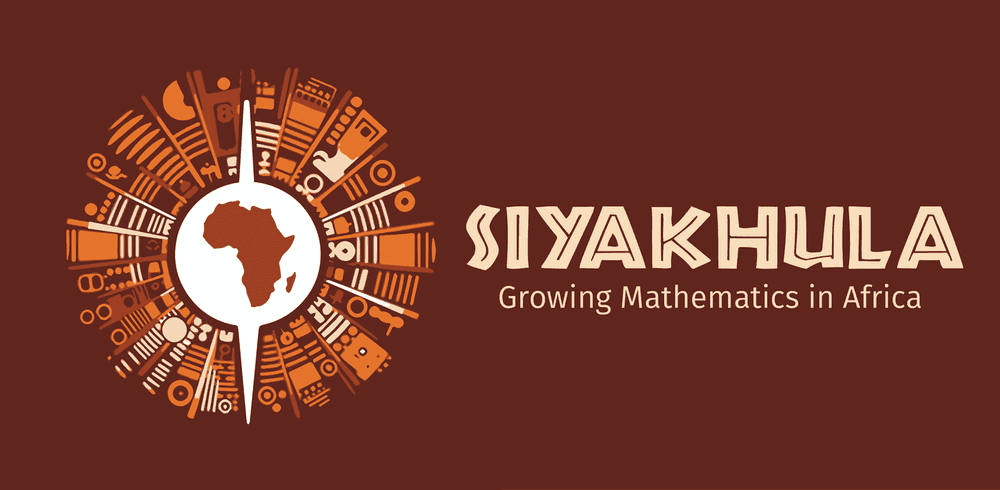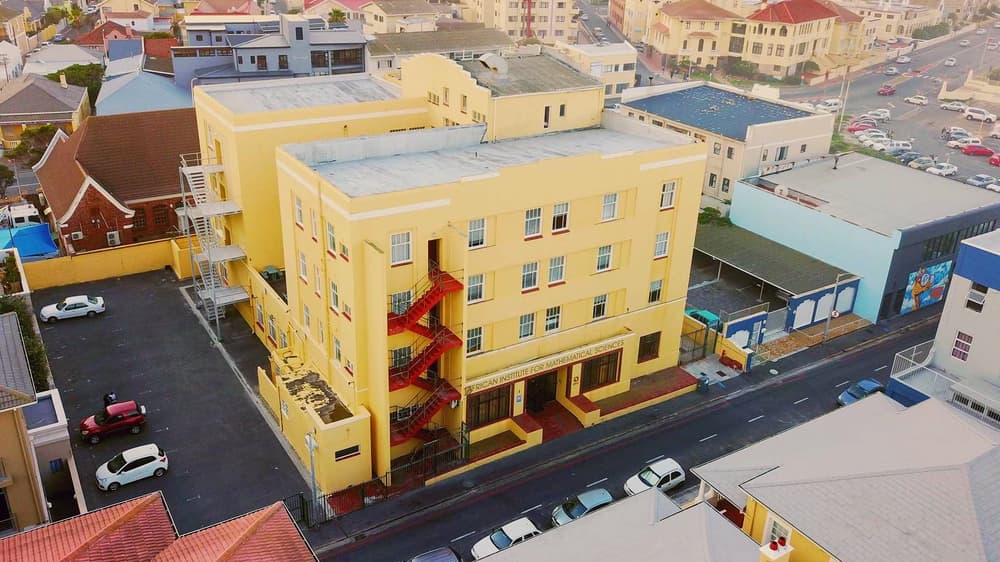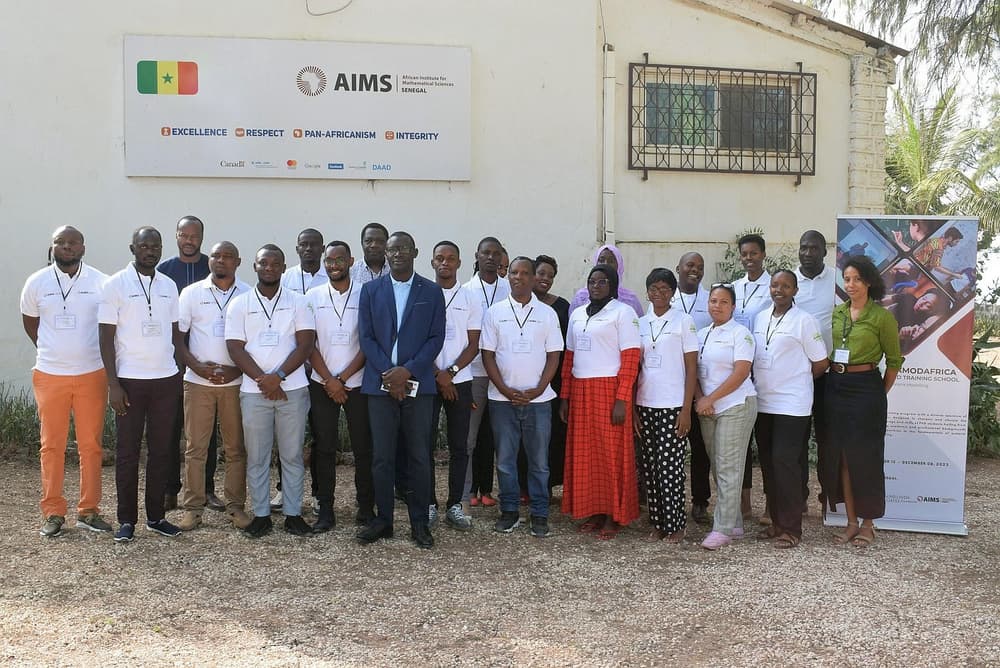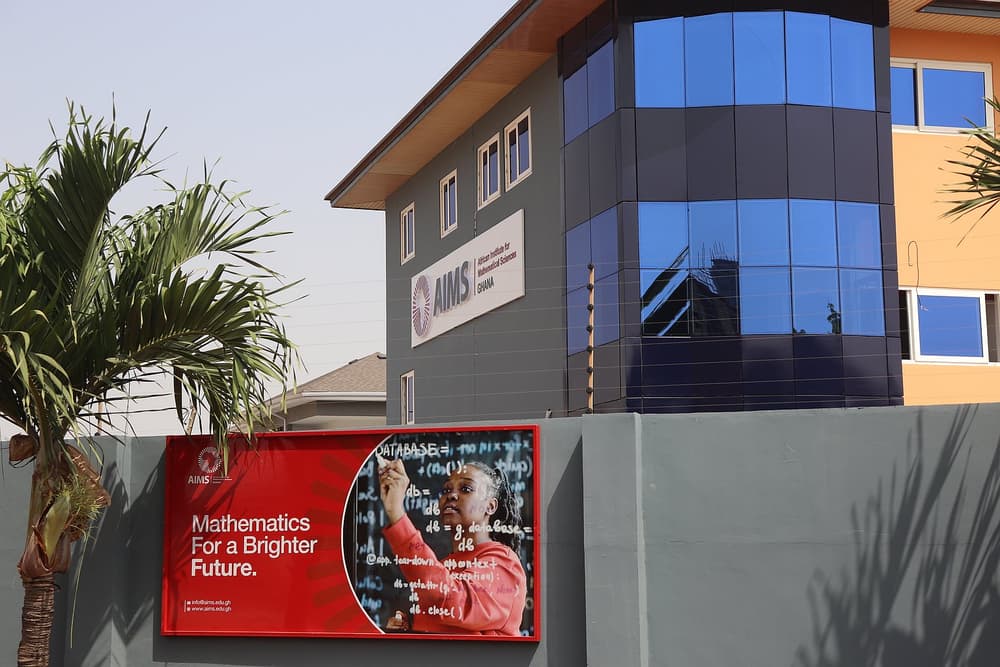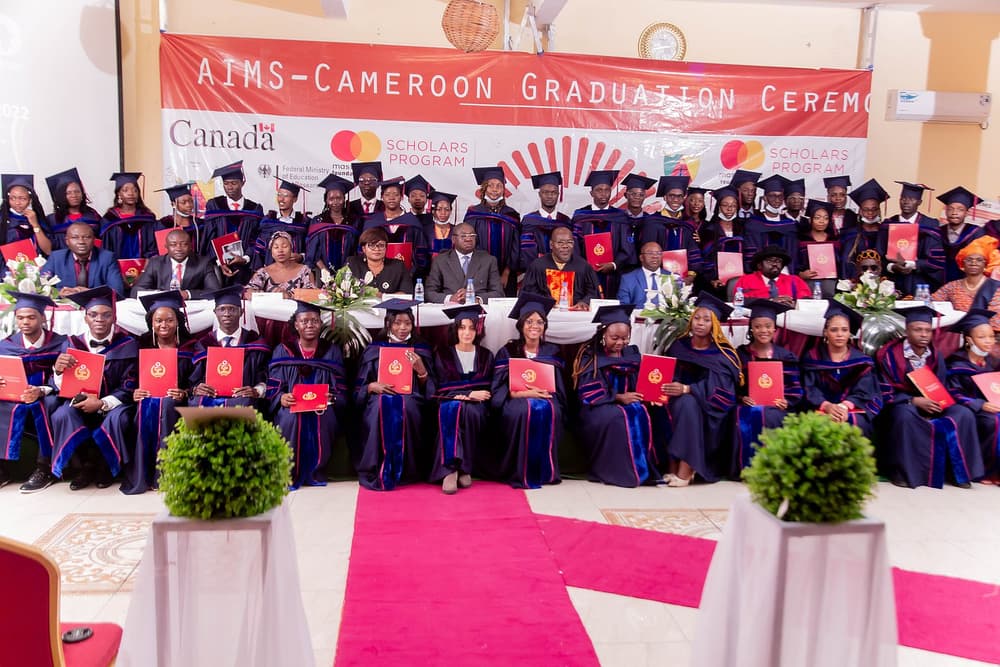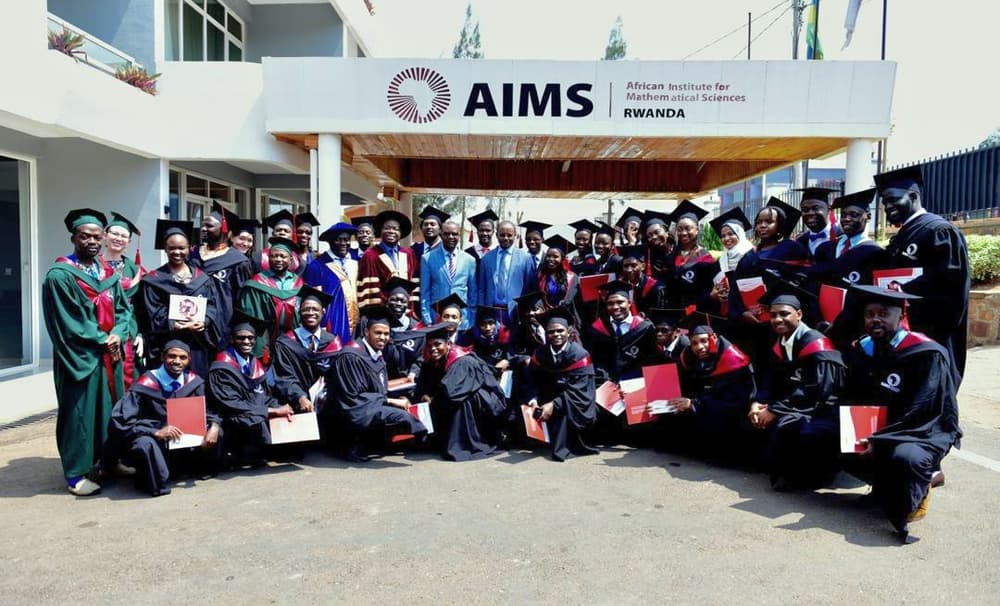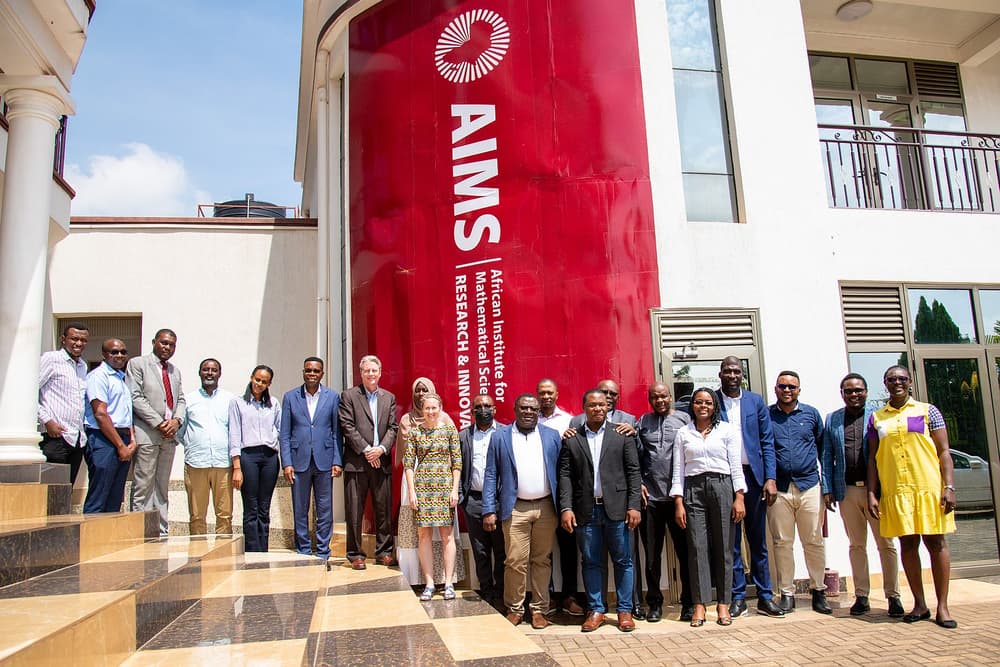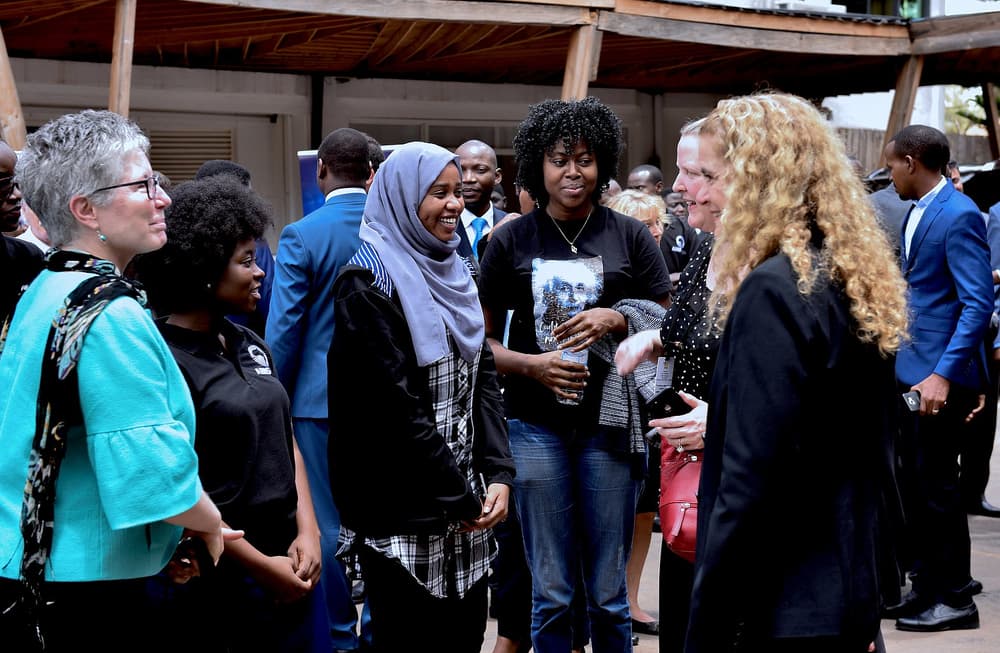The African Institute for Mathematical Sciences (AIMS) is a pan-African network of centres of excellence, strategically positioned to contribute to scientific and technological advancement through education, research and innovation. Its mission is to cultivate Africa’s talented youth into creative leaders of science and technology. AIMS selects the brightest young minds across Africa, shaping them into independent thinkers and problem solvers with the capacity to innovate, ultimately steering Africa toward economic prosperity. Positioned at the heart of the innovation and transformation ecosystem, AIMS offers a comprehensive array of academic and non-academic programs meticulously designed to provide learners with a distinctive postgraduate training experience.
A glimpse into AIMS
As the first and largest network for postgraduate training in mathematical sciences across Africa, AIMS assumes a pivotal role in sculpting a prosperous Africa, driven by innovative education through its five training centres in South Africa, Senegal, Ghana, Cameroon, and Rwanda, complemented by a research and innovation centre in Rwanda. Since its establishment in 2003, AIMS has evolved into the STEM secretariat for Africa, with over 200 partners, more than 250 researchers, and over 500 world-class lecturers. This pivotal role extends beyond borders, as AIMS actively collaborates with academic institutions, research organizations, and industry partners on a global scale. These collaborative efforts serve as conduits for knowledge exchange, resource sharing, and the seamless integration of African scientists into the broader global scientific community.
AIMS offers a comprehensive array of full-time programmes, including a one-year Structured Master’s in Mathematical Sciences, an 18-month Co-operative Education, a Master’s in Mathematical Sciences for Teachers (MMST) programme, and PhD programmes in subjects including data science. The master’s programmes commence at the end of August and follow a three-semester academic structure, aligning with the distinct phases of skills development, review, and research. The skills and review phases are organized into three-week blocks of courses, with the skills phase comprising three mandatory blocks designed to equip students with essential computational and mathematical problem-solving skills. The subsequent review phase encompasses six blocks, requiring students to successfully complete a minimum of eleven courses, a maximum of two per block. This structured approach ensures a robust and thorough preparation for students to maximize their learning experience throughout the programme.
AIMS graduates an average of 300 master’s students every year, with the skills needed to pursue successful careers as university lecturers, research scientists, financial analysts, public health advisors, entrepreneurs, and data scientists among others. By August 2023, AIMS master’s alumni constituted a vibrant community of 3177 youth, 34.6% of whom are women. AIMS alumni have demonstrated remarkable employability globally, spanning the private, public, and academic sectors. As of December 2022, the transition rate into employment and further studies stood at an impressive 88%, with African Master’s in Machine Intelligence (AMMI) graduates leading with the highest transition to employment at 81%, followed by Co-op Master’s at 74%, and Structured Master’s at 59%.
The majority of employed AIMS alumni choose to contribute their skills and expertise within Africa. Their impact is significant across various fields, with tertiary education (such as university lecturers), research (in academic institutions and both public and private sectors), and information and communications technology (ICT) emerging as the top three areas of employment. Diving deeper into their contributions, AIMS alumni are actively engaged in fields crucial for Africa’s development, including climate sciences, epidemiology, and data science – machine learning – AI. Furthermore, their influence extends beyond immediate employment, as they play pivotal roles in advancing STEM education and research. This includes roles as secondary school teachers, university lecturers, and researchers, both within Africa and on a broader international scale. The impact of AIMS alumni resonates not only in their individual success stories but also in their collective efforts towards the progress of STEM fields and education.
Many alumni choose to continue their studies post-AIMS and pursue a research master’s degree or a PhD, the majority of whom receive competitive full scholarships. A total of 35% of AIMS alumni are pursuing further studies, of which 80% are pursuing a PhD and 20% are pursuing a research master’s degree. The top fields of study are mathematics, physics, health, and finance. Of all the alumni who have completed or are pursuing a PhD, 50% of them were accepted directly from the AIMS master’s programme, thereby reflecting the calibre and rigour of the AIMS program.
In March 2024, AIMS celebrated 20 years of impact under the theme Siyakhula: Growing Mathematics in Africa.1https://www.siyakhula.aims.ac.za The festival brought together all mathematicians, including representatives from universities, research institutions, governments, the private sector, civil society organizations, and the general public.
AIMS centres
AIMS South Africa
AIMS South Africa2https://aims.ac.za was established in 2003, in Cape Town, as the first centre born out of a partnership among six universities: Cambridge, Cape Town, Oxford, Paris-Sud XI, Stellenbosch, and Western Cape. The centre collaborates with local universities to integrate specialized courses into regular honours and master’s programmes, fostering innovation through research. In 2008, the AIMS South Africa Research Centre was launched to contribute to advancing African science and academia within a rich multicultural context.
AIMS South Africa Centre in Muizenberg, Cape Town.
🅭🅯 CC BY 4.0Areas of specialization include cosmology and astrophysics, mathematical and physical biosciences, mathematical finance, foundations of mathematics and scientific computing, and data science and information systems. In September 2023, AIMS South Africa launched the AI for Science Master’s programme,3https://ai.aims.ac.za in partnership with Google DeepMind. The centre also empowers teachers across Africa through AIMSSEC,4https://www.aimssec.ac.za amplifying the pipeline of maths and science students through training programs. In alignment with its commitment to showcasing the transformative power of maths and science, AIMS South Africa initiated the House of Science5https://aims.ac.za/2022/08/10/house-of-science-highlights-the-importance-of-public-engagement-and-communication-of-data-science-for-societal-impact-agenda public engagement program which capacitates teachers, elevates public science literacy, and propels mathematics and scientific communication throughout South Africa.
AIMS Senegal
In 2011, with support from the Government of Senegal, AIMS Senegal6https://aims-senegal.org/our-story became the second centre within the AIMS Network, with a master’s programme accredited by the National Authority for Quality Assurance in Higher Education (ANAQ-Sup), Senegal. Since its inception, AIMS Senegal has graduated students through three distinctive pathways: a structured 10-month master’s programme, an 18-month Co-operative Education programme (more than 80% of students following this programme find jobs within the 6 months after graduation), and the African Master’s in Machine Intelligence (AMMI)7https://aimsammi.org programme, which delves into the realm of machine intelligence, catering to the evolving demands of the digital era.
PhD students during the training school on malaria modelling at the AIMS Senegal Centre in Mbour.
🅭🅯 CC BY 4.0In 2013, the AIMS Senegal Research Centre was established with the appointment of Prof. Mouhamed Moustapha Fall (a member of the Scientific board of EMS-CDC) as the German Research Chair. AIMS Senegal researchers have won international mathematics prizes like the Ibni Prize, the Abbas Bahri excellence fellowship of Rutgers University, and the DST-ICTP-IMU Ramanujan prize, in geometric analysis, stochastic PDEs, and biomathematics.
AIMS Ghana
Established in 2012 with the Government of Ghana’s support, AIMS Ghana8https://aims.edu.gh is recognized as a UNESCO Category II Centre of Excellence and is accredited by the National Accreditation Board (Ghana). Its programmes include a structured 10-month master’s programme and a specialized master’s programme for maths teachers (MMST).9https://aims.edu.gh/aims-master-of-mathematical-sciences-for-teachers-mmst The centre also runs a Girls in Mathematical Sciences programme (GMSP)10https://aims.edu.gh/girls-in-mathematical-sciences-programme a fully-funded 9-month initiative for bright female Senior High School students which mentors participants for STEM careers at the highest levels in research, training, and industry, cultivating a new class of leaders in research and innovation.
AIMS Ghana Centre in Accra.
🅭🅯 CC BY 4.0The AIMS Ghana Research Centre opened in 2014 with a focus on quantitative biology and epidemiology. In 2016, a German research chair “Mathematics and its applications” was also recruited. The centre’s research focuses on stochastic analysis and applications, singular stochastic differential equations, optimal control, controllability, integro-differential equations, game theory, dynamic programming, climate change, and quantum algebra.
AIMS Cameroon
Located in Limbe, AIMS Cameroon11https://aims-cameroon.org was established in 2013 with the support of the Government of Cameroon, as the fourth centre. AIMS Cameroon has a structured 10-month programme and an 18-month Co-operative (Co-op) Education programme with a direct link to industry through work placements, a Teacher Training Program (TTP)12https://aims-cameroon.org/teacher-training-program-2 designed to improve learning outcomes in mathematics for secondary school students, and a research centre.
MSc graduation at the AIMS Cameroon Centre in Limbe.
🅭🅯 CC BY 4.0The AIMS Cameroon Research Centre, started in 2017, is supported by Alexander von Humboldt Foundation, DAAD, and the German Federal Ministry of Education and Research, with research areas like mathematical analysis, nonlinear analysis, climate sciences, shape optimization, control theory, deep learning, and big data, which address real-world challenges such as environmental pollution and urban networks.
AIMS Rwanda
Established in 2016 with the support of the Government of Rwanda, AIMS Rwanda13https://aims.ac.rw is the fifth centre of the AIMS Network. The centre offers a structured 10-month master’s programme, along with an 18-month Co-operative (Co-op) Education programme with industrial attachment in various fields including data sciences and malaria modelling, and a training programme in mathematics and sciences for high school teachers in Rwanda.
MSc graduation at the AIMS Rwanda Centre in Kigali.
🅭🅯 CC BY 4.0The centre, in collaboration with Rwandan government institutions, provides short courses leading to certificates for professionals in several fields of interest, including climate sciences, big data analytics and software testing. The AIMS Rwanda Research Centre has two research chairs who work with postdoctoral fellows and PhD candidates in mathematical optimization, data-driven and machine learning applications, discrete mathematics and theoretical computer science.
AIMS Research and Innovation Centre
The AIMS Research and Innovation Centre (AIMS RIC)14https://research.nexteinstein.org is the youngest centre in the AIMS ecosystem, established in 2023. The centre is home to Quantum Leap Africa (QLA) which seeks to prepare Africa for the coming quantum revolution. Research focuses on data science (including machine learning and AI), quantum science, and mathematical modelling, with team members comprising research chairs, resident researchers, postdoctoral fellows, PhD and MPhil students, and interns.
AIMS staff after a meeting at the AIMS Research and Innovation Centre in Kigali, Rwanda.
🅭🅯 CC BY 4.0The centre is positioned to respond to current and emerging challenges such as pandemics, climate change, and food insecurity. For example, the centre’s president, Prof. Wilfred Ndifon, worked with the Rwanda Biomedical Centre (RBC) to lead a team that developed a COVID-19 pool testing method which was successfully used in Rwanda and beyond to track people infected with the SARS-CoV-2 virus. AIMS RIC operates a doctoral training centre currently providing training in data science and malaria modelling.
Other programmes
AIMS Industry Initiative
The AIMS Industry Initiative15https://nexteinstein.org/industry-initiative builds and leverages industry partnerships to identify win-win opportunities for AIMS students and alumni as well as industry partners. These include short-term work placements, internships and employment. AIMS works with organizations to fill top vacancies with proven talent, selected from a base of AIMS graduates and students with world-class training in mathematical sciences and applied research, in addition to other technical and life skills necessary to succeed in performance-driven organizations.
AIMS students interacting with industry partners.
🅭🅯 CC BY 4.0Impact and alumni success
AIMS has made a significant impact in producing a new generation of African scientists and researchers. Its alumni have gone on to pursue successful careers in academia, research, industry, and policymaking, contributing to the advancement of science and technology in Africa. Some success stories can be found on individual centre websites or on the AIMS blog16https://nexteinstein.org/meet-our-alumni under the #AlumoftheWeek series.
Conclusion
This article aims to inspire mathematicians across Africa by highlighting the transformative impact of AIMS on the continent’s mathematical landscape. With a focus on nurturing experiments, stimulating conjectures, and establishing standards for exploring new mathematical frontiers, AIMS provides an inviting environment for mathematicians to actively engage in exploration and experimentation. Beyond being an institution, AIMS serves as a catalyst for mathematicians to embark on journeys of discovery, pushing the boundaries of knowledge and venturing into unexplored territories. This article extends an invitation to mathematicians to join the vibrant community cultivated by AIMS, contributing to the ongoing narrative of growth, exploration, and advancement in mathematics throughout Africa.
For more information about AIMS, please visit the AIMS website.17https://nexteinstein.org
- 1
- 2
- 3
- 4
- 5
- 6
- 7
- 8
- 9
https://aims.edu.gh/aims-master-of-mathematical-sciences-for-teachers-mmst
- 10
https://aims.edu.gh/girls-in-mathematical-sciences-programme
- 11
- 12
- 13
- 14
- 15
- 16
- 17
- 18
Cite this article
Winnie Nakiyingi, African Institute for Mathematical Sciences (AIMS). Eur. Math. Soc. Mag. 132 (2024), pp. 48–52
DOI 10.4171/MAG/193

